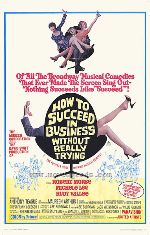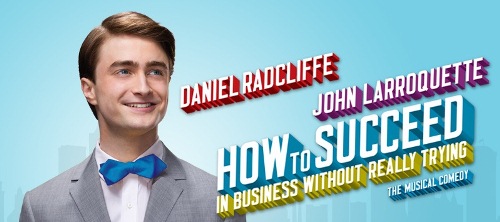
Finch is a window washer who finds a book called "How to Succeed in Business Without Really Trying," which he uses to get a job at World Wide Wickets and move up in the company. Frump, a co-worker he left behind on the way up, tries to sabotage Finch as he gets higher and higher in the organization, but in the end Finch is forced to make a few choices without the help of his book.
Act I
J. Pierrepont Finch, a young window cleaner in New York City, reads the book How to Succeed in Business Without Really Trying as he works. The "Book Voice" tells him that he will succeed if he follows the book's advice. He enters the World Wide Wicket Company searching for a job (How To Succeed).
Finch bumps into J.B. Biggley, the president of the company, who dismisses him to the personnel manager, Mr. Bratt. Rosemary Pilkington, a pretty, young secretary, helps Finch meet Mr. Bratt. Finch tells Bratt that Biggley sent him, and Bratt gives him a job in the mailroom, where he works with Mr. Biggley's lazy, arrogant, and nepotism-minded nephew Bud Frump. Rosemary dreams of a life with Finch in the suburbs (Happy To Keep His Dinner Warm). The fatigued workers rush to get their coffee break (Coffee Break). In the mailroom, Finch earns favor with the long-time head of the mailroom, Mr. Twimble, who tells him the secret to longevity at the company (The Company Way).
Twimble is promoted to head of the shipping department and has to choose his replacement as head of the mailroom. The book warns not to stay in the mailroom too long, so Finch recommends Frump instead of himself. Twimble is reluctant to promote the lazy Frump, but Frump promises to be a good employee (The Company Way (Reprise)). Twimble and Bratt are impressed by Finch's apparent selflessness, and Bratt offers him a job as a junior executive in the Plans and Systems department, headed by Mr. Gatch.
An extremely attractive but air-headed woman named Hedy LaRue, who is Mr. Biggley's secret mistress, is hired as a secretary. On her first day of work, the male employees are instantly attracted to her, but Mr. Bratt warns them against taking advantage of their employees (A Secretary Is Not A Toy). Finch learns from Mr. Biggley's secretary, Mrs. Jones, that Biggley is a proud alumnus of Old Ivy college. In the elevator at the end of the workday, Rosemary's fellow secretary Smitty helps her and Finch set up a date (Been A Long Day). Frump runs into Biggley and Hedy and realizes their relationship, and he blackmails Biggley into giving him a promotion (Been A Long Day (Reprise)).
Finch arrives early Saturday morning and sets up the office so it looks like he has been working all night. Biggley believes Finch's ruse, and Finch convinces Biggley that he, too, is a proud alumnus of Old Ivy (a "groundhog), and they sing the Old Ivy fight song (Grand Old Ivy). Biggley insists that Finch be given his own office and secretary, Hedy. With the book's help, Finch realizes that Biggley must be Hedy's advocate and sends her on an errand to Gatch, knowing that Gatch will make a pass at her. Gatch falls for the trap and is dispatched to Venezuela, and Finch is promoted to his position as head of Plans and Systems.
At a reception for the new Advertising Department head, Benjamin Burton Daniel Ovington, Rosemary hopes to impress Finch with her new "Paris original" dress, but all the other women arrive at the reception wearing the same dress (Paris Original). Frump schemes for Biggley to catch Finch kissing LaRue in his office, but after LaRue blackmails Finch into kissing her, he realizes he's actually in love with Rosemary (Rosemary). After some farcical complications, Frump and Biggley walk into the office just as Finch embraces Rosemary. Ovington is forced to resign when Biggley learns that he is a graduate from Northern State (a "chipmunk), Old Ivy's bitter rival. Biggley names Finch Vice-President in Charge of Advertising. Biggley leaves as Finch and Rosemary declare their love for each other, and Bud Frump vows revenge (Act I Finale).
Act II
Two days later, Rosemary has been neglected by Finch. She decides to quit, but her fellow secretaries convince her to stay because she's living their dream of marrying an executive. (Cinderella, Darling) (In the 1995 revival, this song was replaced with a reprise of "How to Succeed", with the lyrics suggesting ways in which a woman can get hold of a man's financial assets).
The book warns Finch that because Vice-President of Advertising is a bad position, he needs a brilliant idea. Bud Frump slyly tells Finch his idea for a treasure hunt, which Finch loves, unaware that Biggley has already heard the idea and rejected it. Finch shares the idea with Rosemary, who tells him that she'll stay with him no matter what happens.(Happy To Keep His Dinner Warm (Reprise)). Hedy tells Biggley that she is unhappy as a secretary and is leaving for California. He begs her to stay and tells her he loves her, and she agrees to stay (Love From a Heart of Gold). In the executive washroom, Finch gives himself a pep talk while, behind his back, the other executives and Frump plot against him (I Believe In You).
Finch presents "his" idea to Biggley: he will hide five thousand shares of company stock in each of the ten offices around the country and give a television audience weekly clues as to their whereabouts. Biggley accepts this idea when Finch explains that each clue will be given by the scantily-dressed World Wide Wicket Treasure Girl: Miss Hedy LaRue.
During the first television show, Hedy is asked to swear on a Bible that she doesn't know the location of the prizes. Hedy panics and reveals the locations to the entire television audience, which prompts all the Wicket employees to tear apart the offices looking for them. The book tells Finch, "How To Handle a Disaster. ...We suggest that your best bet if you are the cause of the Disaster is to review the first chapter of this book: 'How to Apply for a Job' ".
The executives, including Chairman of the Board Wally Womper, are waiting in Biggley's office for Finch's resignation. Rosemary again tells Finch that she'll stand by him no matter what (I Believe in You (Reprise)). About to sign his letter of resignation, Finch mentions that he'll probably go back to washing windows. Womper is drawn to Finch as he, too, was a window washer and they both "had a book": Wally's book was a book of betting records. Finch blames the treasure hunt on Frump, also mentioning that Frump is Biggley's nephew. Womper is about to "clean house from top to bottom", when Finch steps in on everyone's behalf. Finch tells the executives that even though the business world is a place filled with betrayal and competitiveness, the World Wide Wicket staff is like a family to him (Brotherhood of Man). Everyone is spared except Frump, who is fired because he is Biggley's nephew.
Biggley remains president, Womper retires to travel the world with his new wife, Hedy, and Finch becomes Chairman of the Board. Rosemary stands by his side and inadvertently inspires him to aspire for the Presidency of the United States. Frump gets a job washing windows, swearing revenge against Finch (Finale).
In 1952, Shepherd Mead's satirical book, How to Succeed in Business Without Really Trying, became a bestseller. Playwright Willie Gilbert and fellow playwright Jack Weinstock created a dramatic interpretation in 1955 that was unproduced for five years. Agent Abe Newborn brought the work to the attention of producers Cy Feuer and Ernest Martin, with the intention of retooling it as a musical. Feuer and Martin had great success with the 1950 adaptation of Guys and Dolls and brought in the creative team from that show to work on How to.... Abe Burrows and Frank Loesser set to work on the new adaptation, with rehearsals beginning in August 1961. Burrows collaborated on the book with Jack Weinstock and Willie Gilbert, also serving as director. Their new adaptation became even more satirical and added romance to the story. Loesser wrote both music and lyrics for the show, which was orchestrated by Robert Ginzler.
The original Broadway production credited the choreography to an obscure dance director named Hugh Lambert, while the much better-known Bob Fosse received only a "musical staging by..." credit. Abe Burrows explains this in his autobiography Honest, Abe. While How to Succeed... was in its early development, producer Cy Feuer attended a trade show and was extremely impressed by an elaborate dance number created by Lambert, prompting Feuer to hire Lambert to choreograph the new musical. According to Burrows, it soon became clear in rehearsals that Lambert's creative abilities were completely used up in that one elaborate dance number. Bob Fosse was brought in to replace him, but Fosse was unwilling to hurt Lambert's career by having him fired. Lambert's trade-show dance number was recycled as the "Treasure Hunt" dance in How to Succeed..., while Fosse agreed to take a "musical staging" credit for choreographing all the other dance numbers. Burrows also reveals that another crisis arose in rehearsals when former recording star Rudy Vallee wanted to interpolate some of his hit songs from the 1930s.
Broadway (1961-1965)
The show opened on Broadway on October 14, 1961 at the 46th Street Theatre, and closed on March 6, 1965 after 1,417 performances. The cast starred Robert Morse as Finch, Bonnie Scott as his secretary Rosemary, Charles Nelson Reilly as Bud Frump, and Rudy Vallee as the company president. Virginia Martin played Hedy LaRue.
West End (1963-1964)
The West End production opened at the Shaftesbury Theatre on March 28, 1963 and ran for 520 performances. It was also directed by Burrows and Bob Fosse, and featured a new London cast. Warren Berlinger and Billy De Wolfe starred as Finch and Biggley respectively, with Patricia Michael as Rosemary, Josephine Blake as Smitty, David Knight as Bud Frump, Olive Lucius as Miss Jones, Bernard Spear as Mr. Twimble, and Eileen Gourlay as Hedy La Rue.
Broadway revival (1995-1996)
A Broadway revival opened at the original theatre, now renamed Richard Rodgers Theatre on March 23, 1995 and closed on July 14, 1996 after 548 performances. It was directed by Des McAnuff and choreographed by Wayne Cilento. Matthew Broderick starred as Finch, and Rosemary was played by Megan Mullally. In a pre-recorded performance, Walter Cronkite was the Book Voice. The replacements for Mullally and Broderick were Broderick's future wife, Sarah Jessica Parker as Rosemary and John Stamos as Finch. The wardrobe was designed by Susan Hilferty and is on display at the Costume World Broadway Collection in Pompano Beach, Florida.
US National Tour (1996-1997)
A national tour of 'How To Succeed' ran beginning in Baltimore in May 1996 and ended in Milwaukee in June 1997. Other stops included Sacramento, Portland, and Seattle. The national tour cast featured Ralph Macchio as J. Pierrepont Finch, Shauna Hicks (Rosemary Pilkington), Richard Thomsen (J.B. Biggley), Pamela Blair (Hedy LaRue), and Roger Bart (Bud Frump). Both Macchio and the production played to favorable reviews.
Broadway revival (2011-2012)
Daniel Radcliffe was featured in a reading in December 2009, with Rob Ashford as director and choreographer. Radcliffe starred in the revival for ten months, which began previews at the Al Hirschfeld Theatre on February 26, 2011, with the official opening on March 27, 2011. Rob Ashford directs and choreographs. Other cast includes Rose Hemingway as Rosemary Pilkington, Mary Faber as Smitty, Tammy Blanchard as Hedy La Rue, Christopher Hanke as Bud Frump, and John Larroquette as J.B. Biggley. Anderson Cooper has recorded the Voice of the Book for the adaptation. The production was nominated for nine 2011 Tony Awards, including for director-choreographer Rob Ashford and as Best Revival of a Musical. John Larroquette won the Tony Award for Best Featured Actor in a Musical.
Darren Criss succeeded Radcliffe in the role of J. Pierrepont Finch for a limited three week engagement from January 3–22, 2012. Criss was awarded the Broadway.com Audience Choice Award for Favorite Replacement for his performance in this role. Beau Bridges replaced John Larroquette as J.B. Biggley starting January 3, 2012. Nick Jonas took over the role of Finch on January 24, 2012. Jonas was nominated for a 2012 Broadway Beacon Award for his performance in this role. Michael Urie replaced Christopher Hanke in the role of Bud Frump starting on January 24, 2012.
The production closed on May 20, 2012 after 30 previews and 473 regular performances.
Act I
Overture
How To Succeed - J. Pierrepont Finch
Happy To Keep His Dinner Warm - Rosemary Pilkington
Coffee Break - Smitty, Bud Frump & Chorus
The Company Way - Finch & Twimble
The Company Way (Reprise) - Bud, Twimble & Company
A Secretary is Not a Toy - Bratt, Bud & Men
Been a Long Day - Smitty, Finch & Rosemary
Been a Long Day (Reprise )- Bud, J.B. Biggley & Hedy LaRue
Grand Old Ivy - Finch & Biggley
Paris Original - Rosemary, Smitty, Mrs. Jones & Girls
Rosemary - Finch & Rosemary
Act I Finale - Finch, Rosemary & Bud
Act II
Cinderella, Darling - Smitty & Girls
1995 revival replacement: How to Succeed (Reprise)
Happy To Keep His Dinner Warm (Reprise) - Rosemary
Love From a Heart of Gold - Biggley & Hedy
I Believe in You - Finch & Men
I Believe in You (Reprise) - Rosemary
Brotherhood of Man - Finch, Wally Womper, Mrs. Jones & Men
Finale - Company
Major Characters
J. Pierrepont Finch - a window washer who applies for a job at the World Wide Wicket Company.
Rosemary Pilkington - a secretary at the World Wide Wicket Company who instantly falls in love with Finch.
J.B. Biggley - The boss of the World Wide Wicket Company.
Bud Frump - Biggley's arrogant and lazy nephew.
Hedy LaRue - Biggley's attractive and dim-witted mistress.
Supporting Characters
Miss Jones - Biggley's immovable secretary who is charmed by Finch.
Book voice - the "voice" of the book How To Succeed In Business Without Really Trying which narrates the musical
Mr. Bert Bratt - Personnel manager
Mr. Twimble - Head of the mailroom for 25 years; finally gets promoted to the shipping department.
Smitty - Rosemary's best friend and fellow secretary at the World Wide Wicket Company
Mr. Milton Gatch - head of the Plans and Systems department
Miss Krumholtz - a secretary of Mr. Gatch, then J. Pierrepont Finch.
Mr. Benjamin Burton Daniel Ovington - prospective head of the advertising department until Finch reveals that he has graduated from Biggley's college's archrival; he is often referred to in the show by his initials, "BBDO".
Mr. Wally Womper - the Chairman of the World Wide Wicket Company. He is traditionally played by the same actor as Twimble.
Executives and Secretaries - Chorus
Aucun dossier informatif complémentaire concernant How to Succeed in Business Without Really Trying
Aucun dossier informatif complémentaire concernant How to Succeed in Business Without Really Trying
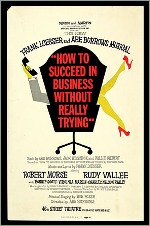
Version 1
How to Succeed ... (1961-10-Richard Rodgers Theatre-Broadway)
Type de série: OriginalThéâtre: Richard Rodgers Theatre (Broadway - Etats-Unis) Durée : 3 ans 4 mois 3 semaines Nombre : 3 previews - 1417 représentationsPremière Preview : 12 October 1961
Première: 14 October 1961
Dernière: 06 March 1965Mise en scène : Abe Burrows • Chorégraphie : Hugh Lambert • Producteur : Star(s) : Commentaires longs: Nominated for eight Tony Awards and won for Best Musical, Best Book, Best Direction of a Musical, Best Conductor and Musical Director, Best Producers of a Musical, Best Performance by a Leading Actor in a Musical for Robert Morse, and Best Performance by a Featured Actor in a Musical for Charles Nelson Reilly.[8] It also received the Best Musical Award from the New York Drama Critics Circle.
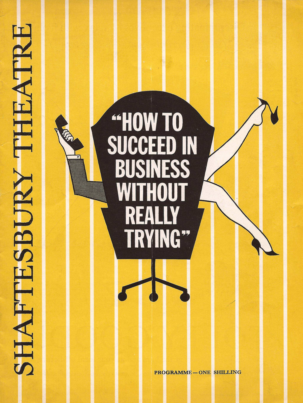
Version 2
How to Succeed ... (1963-03-Shaftesbury Theatre-London)
Type de série: Original LondonThéâtre: Shaftesbury Theatre (Londres - Angleterre) Durée : Nombre : 520 représentationsPremière Preview : 28 March 1963
Première: 28 March 1963
Dernière: InconnuMise en scène : Abe Burrows • Chorégraphie : Bob Fosse • Hugh Lambert • Producteur : Star(s) : Avec: Finch ... Warren Berlinger / J. B. Biggley ... Billy De Wolfe / Frump ... David Knight / Gatch ... Laurie Webb / Peterson ... Michael Billington / Johnson ... Roy Jameson / Jenkins ... Peter Dalton / Mathews ... Keith Galloway / Tackaberry ... David Henderson-Tate / Rosemary ... Patricia MichaelCommentaires longs: C'est avec ce musical que le Shaftesbury Theatre rénové a réouvert…
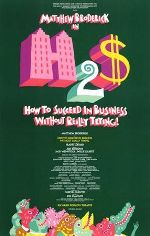
Version 4
How to Succeed ... (1995-03-Richard Rodgers Theatre-Broadway)
Type de série: RevivalThéâtre: Richard Rodgers Theatre (Broadway - Etats-Unis) Durée : 1 an 3 mois 3 semaines Nombre : 16 previews - 548 représentationsPremière Preview : 10 March 1995
Première: 23 March 1995
Dernière: 14 July 1996Mise en scène : Des McAnuff • Chorégraphie : Wayne Cilento • Producteur : Star(s) : Commentaires longs: A Broadway revival opened at the original theatre, now re-named Richard Rodgers Theatre on March 23, 1995 and closed on July 14, 1996 after 548 performances. It was directed by Des McAnuff and choreographed by Wayne Cilento. Matthew Broderick starred as Finch, and Rosemary was played by Megan Mullally. In a pre-recorded performance, Walter Cronkite was the Book Voice. One of the later replacements for Mullally was Broderick's future wife, Sarah Jessica Parker. The wardrobe was designed by Susan Hilferty and is on display at the Costume World Broadway Collection in Pompano Beach, Florida.
A national tour of "How To Succeed" ran beginning in Baltimore in May 1996 and ended in Milwaukee in June of 1997. Other stops included Sacramento, Portland, and Seattle. The national tour cast featured Ralph Macchio as J. Pierrepont Finch, Shauna Hicks (Rosemary Pilkington), Richard Thomsen (J.B. Biggley), Pamela Blair (Hedy LaRue), and Roger Bart (Bud Frump). Both Machhio and the prodcution played to favorable reviews.
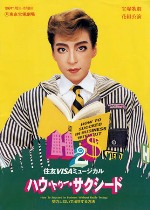
Version 5
How to Succeed ... (1996-06-Takarazuka Grand Theatre-Takarazuka) Flower Troupe
Type de série: TakarazukaThéâtre: Takarazuka Grand Theatre (Takarazuka - Japon) Durée : 2 mois Nombre : Première Preview : 21 June 1996
Première: 21 June 1996
Dernière: 25 August 1996Mise en scène : ???? ???? • Chorégraphie : ???? ???? • Producteur : Star(s) :

Version 6
How to Succeed ... (1996-11-Takarazuka Theatre-Tokyo) Flower Troupe
Type de série: TakarazukaThéâtre: Takarazuka Theatre (Tokyo - Japon) Durée : 3 semaines Nombre : Première Preview : 02 November 1996
Première: 02 November 1996
Dernière: 28 November 1996Mise en scène : Chorégraphie : Producteur : Star(s) :

Version 7
How to succeed ... (1999-02-Landor Theatre-Londres)
Type de série: RevivalThéâtre: Landor Theatre (Londres - Angleterre) Durée : 3 semaines Nombre : Première Preview : 26 February 1999
Première: 26 February 1999
Dernière: 20 March 1999Mise en scène : Guy James • Chorégraphie : Ralph Beaumont • Producteur : Star(s) : Avec: Adam Keast (J. Pierpoint Finch), Don Fellows (J.B.Biggeley), Mark Sangster (Bud Frump), Katie Milton (Rosemary), Alison Carter (Hedy la Rue), Claire Carpenter (Smitty), Georgie Fellows (Miss Krumholz)Commentaires : This fringe revival was notable for the appearance of veteran American performer, Don Fellows, together with his youngest daughter, Geòrgie. Whilst the general view was it had been cleverly adapted to the much smaller space, there was universal condemnation for the pre-recorded musical accompaniment - created by synthesisers.
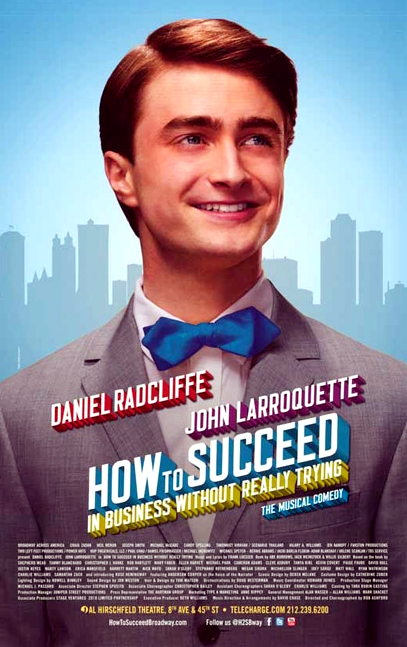
Version 8
How to succeed ... (2011-02-Al Hirschfeld Theatre-Broadway)
Type de série: RevivalThéâtre: Al Hirschfeld Theatre (Broadway - Etats-Unis) Durée : 1 an 1 mois 3 semaines Nombre : 30 previews - 473 représentationsPremière Preview : 26 February 2011
Première: 27 March 2011
Dernière: 20 May 2012Mise en scène : Rob Ashford • Chorégraphie : Rob Ashford • Producteur : Star(s) : Avec: J. Pierrepont Finch ... Daniel Radcliffe / J. B. Biggley ... John Larroquette / Narrator [recorded voice only] ... Anderson Cooper / Rosemary ... Rose Hemingway / Bud Frump ... Christopher J. Hanke / Hedy LaRue ... Tammy Blanchard / Twimble ... Rob Bartlett / Wally Womper ... Rob Bartlett / Smitty ... Mary Faber / Miss Jones ... Ellen HarveCommentaires longs: Daniel Radcliffe was featured in a reading in December 2009, with Rob Ashford as director and choreographer. Radcliffe is now starring in the revival, which began previews at the Al Hirschfeld Theatre on February 26, 2011, with the official opening on March 27, 2011. Rob Ashford directs and choreographs. Other cast includes Rose Hemingway as Rosemary Pilkington, Mary Faber as Smitty, Tammy Blanchard as Hedy La Rue, Christopher Hanke as Bud Frump, and John Larroquette as J.B. Biggley. Anderson Cooper has recorded the Voice of the Book for the adaptation. The production is nominated for nine 2011 Tony Awards, including for director-choreographer Rob Ashford and as Best Revival of a Musical.
The show cancelled three performances in July, due to Radcliffe's promotional duties for the final Harry Potter film. However, Warner Bros. - the producers of the film - agreed to buy out the theatre for those three nights, so the production wouldn't lose any money.
The June 22nd performance was cancelled due to the death of a stagehand backstage just prior to the start of the show. It was later reported that heroin was found in his workspace.Presse : "Charm-free revival." Ben Brantley for New York Times / "Radcliffe is a likable but very boyish presence. ... He's waxen and not animated enough. Director-choreographer Rob Ashford's production is bright, cheerful and energetic, that's for sure." Joe Dziemianowicz for New York Daily News / "Radcliffe is back, front and center. ... it's giddy fun to watch him shake his little tush in "Brotherhood of Man." Elisabeth Vincentelli for New York Post / "High-octane, hard-working revival. Radcliffe doesn’t catch fire until late in the second act of Frank Loesser and Abe Burrows’s delectable satire of Big Business, ‘50s-style. But there’s more than enough to divert the eye and ear along the way." Jeremy Gerald for Bloomberg / "The show ends up frenetic and dull all at the same time." David Sheward for Back Stage / "His (Radcliffe's) performance is committed and decent, though not glowing. ...If you regard the show primarily as a showcase for Radcliffe – he's plainly meant to be its draw – the production's shortcomings might not matter so much" Robert Feldberg for The Record / "Daniel Radcliffe succeeds nicely as a musical comedy performer in the okay Broadway revival." Michael Sommers for Newsroom Jersey / "quaint can be charming and agreeable, which is generally where this medium-wattage 50th anniversary revival lands. Charming and agreeable are adjectives that also apply to the performer around whom it was packaged, Daniel Radcliffe." David Rooney for Hollywood Reporter / "Featuring a dazzling Daniel Radcliffe and a strong Broadway debut for John Larroquette, "Business" takes its place at the executive level in a season of musical-comedy hits. .....Production lapses are easily overlooked, thanks to the ministrations of the expert cast led by Radcliffe, who repeatedly brings down the house with a smile and a barely raised brow. " Steven Suskin for Variety
Pas encore de video disponible pour ce spectacle
